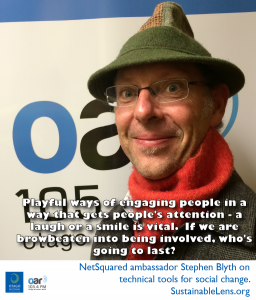Playful ways of engaging people in a way that gets people’s attention – a laugh or a smile is vital.  If we are browbeaten into being involved, who’s going to last?
Stephen Blyth works to empower people in Tangata Whenua, community and volunteer groups.  He is a Net Squared Ambassador and we talk about that role – it’s not about a long list of apps, but about getting a better understanding of where technology fits in to support social change.  Stephen found himself helping to create the first version of CommunityNet Aotearoa in 1998.  He’s barely turned his back on the community and the internet ever since. After leading this pioneering community website he has worked in a wide variety of advisory, capacity building and communications roles for government agencies, and tangata whenua, commuity and voluntary sector organisations. Currently he is instigator of Common Knowledge, a provider of services to good causes to help them effectively use the web, and works part-time for Community Research.
Talking points
I decided to spend my career involved in change.
There’s a large number of people on the planet, we’re a finite planet, the quality of life that we’re experiencing is very different in different parts of the world and even within our own country.
I believe that everyone could have a good life, with rewarding work, healthy families in an environment that is sustained for all our future generations. Â But unfortunately we seem to be trapped in a pattern that is going against the inbuilt and inherent care that we as humans have for other people.
What has to change is quite a lot, but in a way it’s getting back to living out some of the human values that have been brushed over in what I consider a very materialistic, individualistic society.
It’s not about doing without. The way that we live, Â highly urbanised, driving everywhere, thinking that we can buy happiness – just doesn’t gel for me.
We really have to fight to make sure that other world views are heard.
We need the time to create things, we’ve gotten sucked into the idea that we have to buy everything.
A 40 hour work week is the norm – more for many people -  is that as satisfying as it could be for an individual,  or could some richness and other benefits come from being part of an active community?
People participating on their own terms.
Often in a workplace the work is about the skills and experience you bring, but not about you – you have to leave yourself at the door – there’s not a role for the fuller complexity of your life. Â In a community setting you can be more yourself.
We undervalue the important services, but its not about the individuals, it’s about the structure that we’re in, and it’s a structure of great inequality.
There’s an inbuilt inertia and an inbuilt set of set of incentives for a certain group of people to maintain things as they are.
There’s a different way of doing things, we don’t all have to become mini-businesses.
We’ve held ourselves hostage to a set of assumptions that a health society is about growth.
The danger of monetising everything, costing harm as monetary harm, that it leads “pay it  off, pay some money and eliminate the harm”  – but its a falsehood – the harm still exists.
I want to encourage more cooperation – individual achievements still respected, but people coming together in a common place.
People are no longer loyal to one community group – I like this cause now – so a lot of work has to go into staying visible. Â But ethics and a good perspective are key.
Technical tools for social change.
(On campaigns such as Greenpeace’s polar bear costume) You’ve got to appeal to people, and its not just about ideas. Â That’s one of the traps for people who really believe in good causes – “if only people understood the rational, logic of the ideas about parts per million, or the concentration of this…” that would win people over, but its actually also about your heart. Â So you need to attend to both.
I know that there’s a lot of bad stuff, but I choose to get involved in things that will give me the energy to carry on.
My personal line on activism is where it causes harm to others, I struggle with this, and I respect others for the line they walk – sometimes a very fine line.
Local groups are about engaging people in local stories, the numbers (of people) don’t matter so much.
We can’t privilege one set of knowledge over another.
Activist? Â Change maker. Â Activist sensibility in critiquing and wanting to challenge. Â I’ve definitely had my moments.
Challenges: Fighting apathy and cyncism. Â The challenges we face are so huge. Â It worries me deeply, especially as a father – what world are we creating for our children? Â So I’m challenged by my own sense of whether I can make a change. Â Â I involve myself in things that reward me and give me energy to carry on and make a change. Â As long as I’m involved in the fray in the smallest way I’ll be happy.
I wish to stay positive and surround myself with people that have that sense of positivity that we can bring about the change that we so deeply need.
Advice: Be kind to yourselves, be dedicated to the sense of change but have fun. Â Whatever we need to achieve won’t be achieved in our own lifespan. Â We’re not going solve this just by our intellects, we have to bring our full selves, so allow yourself to have some fun.

